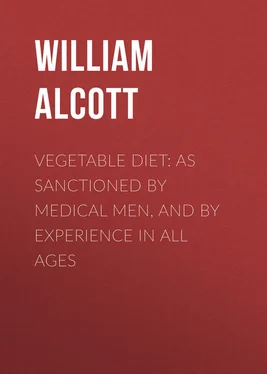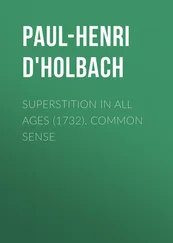William Alcott - Vegetable Diet - As Sanctioned by Medical Men, and by Experience in All Ages
Здесь есть возможность читать онлайн «William Alcott - Vegetable Diet - As Sanctioned by Medical Men, and by Experience in All Ages» — ознакомительный отрывок электронной книги совершенно бесплатно, а после прочтения отрывка купить полную версию. В некоторых случаях можно слушать аудио, скачать через торрент в формате fb2 и присутствует краткое содержание. Жанр: foreign_antique, foreign_prose, на английском языке. Описание произведения, (предисловие) а так же отзывы посетителей доступны на портале библиотеки ЛибКат.
- Название:Vegetable Diet: As Sanctioned by Medical Men, and by Experience in All Ages
- Автор:
- Жанр:
- Год:неизвестен
- ISBN:нет данных
- Рейтинг книги:5 / 5. Голосов: 1
-
Избранное:Добавить в избранное
- Отзывы:
-
Ваша оценка:
- 100
- 1
- 2
- 3
- 4
- 5
Vegetable Diet: As Sanctioned by Medical Men, and by Experience in All Ages: краткое содержание, описание и аннотация
Предлагаем к чтению аннотацию, описание, краткое содержание или предисловие (зависит от того, что написал сам автор книги «Vegetable Diet: As Sanctioned by Medical Men, and by Experience in All Ages»). Если вы не нашли необходимую информацию о книге — напишите в комментариях, мы постараемся отыскать её.
Vegetable Diet: As Sanctioned by Medical Men, and by Experience in All Ages — читать онлайн ознакомительный отрывок
Ниже представлен текст книги, разбитый по страницам. Система сохранения места последней прочитанной страницы, позволяет с удобством читать онлайн бесплатно книгу «Vegetable Diet: As Sanctioned by Medical Men, and by Experience in All Ages», без необходимости каждый раз заново искать на чём Вы остановились. Поставьте закладку, и сможете в любой момент перейти на страницу, на которой закончили чтение.
Интервал:
Закладка:
To the question, whether any constitutional infirmities were aggravated or removed by the new course of regimen, the replies are almost equally favorable to the vegetable system. It is true that one of the physicians, Dr. Parmly, thinks the beneficial effects which appeared in the circle of his observation were the results of a simultaneous discontinuance of fermented drinks, tea and coffee, and condiments. But I believe every one who reads his letter will be surprised at his conclusions. No matter, however; we have his facts, and we are quite willing they should be carefully considered. The singular case of Dr. Preston, I now leave wholly out of the account. It was, as I have since learned, the story of a very singular man .
Among the diseases and difficulties which were removed, or supposed to be removed, by the new diet, were dyspepsia, with the constipation which usually attends it, general lassitude, rheumatism, periodical headache, palpitations, irritation of the first passages, eruptive diseases of the skin, scurvy, and consumption.
The case of Dr. Bannister, who was, in early life, decidedly consumptive, is one of the most remarkable on record. Though evidently consumptive, and near the borders of the grave, between the ages of twenty and twenty-nine, he so far recovered as to be, at the age of fifty-three, entirely free from every symptom of phthisis for twenty-four years; during which whole period, he was sufficiently vigorous to follow the laborious business of a country physician.
The confidence of Dr. Wright in the prophylactic powers of a diet exclusively vegetable, so far as the mere opinion of one medical man is to be received as testimony in the case, is also remarkable. He not only regards the vegetable system as a defence against the diseases of miasmatic regions, but also against the varioloid disease. On the latter point, he goes, it seems, almost as far as Mr. Graham, who appears to regard it not only as, in some measure, a preventive of epidemic diseases generally, in which he is most undoubtedly correct, but also of the small-pox.
The testimony on another point which is presented in the replies to Dr. North's questions, is almost equally uniform. In nearly every instance, the individuals who have abandoned animal food have found themselves less subject to colds than before; and some appear to have fallen into the habit of escaping them altogether. When it is considered how serious are the consequences of taking cold – when it is remembered that something like one half of the diseases of our climate have their origin in this source – it is certainly no trifling evidence in favor of a course of regimen, that, besides being highly favorable in every other respect, it should prove the means of freeing mankind from exposure to a malady at once troublesome in itself and disastrous in its consequences.
In reply to the question, – Is a vegetable diet more or less aperient than a mixed one, – the answers have been the same, in nearly every instance, that it is more so.
The answers to the question whether it was believed the health of either laborers or students would be promoted by the exclusion of animal food from their diet, are rather various. It will be observed, however, that many of the replies, in this case, are medical opinions , and come from men who, though they felt themselves bound to state facts, were doubtless, with very few exceptions, prejudiced against an exclusively vegetable regimen for the healthy. It is, therefore, to me, a matter of surprise, to find some of them in favor of the said prescribed course of regimen, both for students and laborers, and many of them in favor of the discontinuance of animal food by students. Those who have themselves made the experiment, with hardly an exception, are decidedly in favor of a vegetable regimen for all classes of mankind, particularly the sedentary. And in regard to the necessity of diminishing the proportion of animal food consumed by all classes, there seems to be but one voice.
On one more important point there is a very general concurrence of opinion. I allude to the choice of articles from the vegetable kingdom. The farinacea are considered as the best; especially wheat, ground without bolting. The preference of Dr. Preston is an exception; and there are one or two others.
On the whole – I repeat it – the testimony is far more favorable to the "prescribed course of regimen," both for the healthy and diseased than under the circumstances connected with the inquiry the most thorough-going vegetable eater could possibly have anticipated. If this is a fair specimen – and I know no reason why it may not be regarded as such – of the results of similar experiments and similar observations among medical men throughout our country, could their observations and experiments be collected, it certainly confirms the views which some among us have long entertained on this subject, and which will be still more strongly confirmed by evidence which will be produced in the following chapters. Had similar efforts been made forty or fifty years ago, to ascertain the views of physicians and others respecting the benefits or safety of excluding wine and other fermented drinks in the treatment of several diseases, in which not one in ten of our modern practitioners would now venture to use them, as well as among the healthy, I believe the results would have been of a very different character. The opinions, at least, of the physicians themselves, would most certainly have been, nearly without a dissenting voice, that the entire rejection of wine and fermented liquors was dangerous to the sick, and unsafe to many of the healthy, especially the hard laborer. And there is quite as much reason to believe that animal food will be discarded from our tables in the progress of a century to come, as there was, in 1800, for believing that all drinks but water would be laid aside in the progress of the century which is now passing.
CHAPTER IV.
ADDITIONAL INTELLIGENCE
Letter from Dr. H. A. Barrows. – Dr. J. M. B. Harden. – Dr. J. Porter. – Dr. N. J. Knight. – Dr. Lester Keep. – Second letter from Dr. Keep. – Dr. Henry H. Brown. – Dr. Franklin Knox. – From a Physician. – Additional statements by the Author.
During the years 1837 and 1838 I wrote to several of the physicians whose names, experiments, and facts appear in Chapter II. Their answers, so far as received, are now to be presented.
I have also received interesting letters from several other physicians in New England and elsewhere – but particularly in New England – on the same general subject, which, with an additional statement of my own case, I have added to the foregoing. I might have added a hundred authentic cases, of similar import. I might also have obtained an additional amount of the same sort of intelligence, had it not been for the want of time, amid numerous other pressing avocations, for correspondence of this kind. Besides, if what I have obtained is not satisfactory, I have many doubts whether more would be so.
The first letter I shall insert is from Dr. H. A. Barrows, of Phillips, in Maine. It is dated October 10, 1837, and may be considered as a sequel to that written by him to Dr. North, though it is addressed to the author of this volume.
LETTER I. – FROM DR. H. A. BARROWS
Dear Sir, – As to food, my course of living has been quite uniform for the last two or three years – principally as follows. Wheat meal bread, potatoes, butter, and baked sweet apples for breakfast and dinners; for suppers, old dry flour bread, which, eaten very leisurely without butter, sauce, or drink, sits the lightest and best of any thing I eat. But I cannot make this my principal diet, because the bowels will not act ( without physic ) unless they have the spur of wheat bran two thirds of the time. I have at times practiced going to bed without any third meal; and have found myself amply rewarded for this kind of fasting, and the consequent respite thereby afforded the stomach, in quiet sleep and improved condition the next day. And as to drink, I still use cold water, which I take with as great a zest, and as keen a relish, as the inebriate does his stimulus. I seldom drink any thing with my meals; and if I could live without drinking any thing between meals, I think I should be rid of the principal "thorn in my side," the acetous fermentation so constantly going on in my epigastric storehouse.
Читать дальшеИнтервал:
Закладка:
Похожие книги на «Vegetable Diet: As Sanctioned by Medical Men, and by Experience in All Ages»
Представляем Вашему вниманию похожие книги на «Vegetable Diet: As Sanctioned by Medical Men, and by Experience in All Ages» списком для выбора. Мы отобрали схожую по названию и смыслу литературу в надежде предоставить читателям больше вариантов отыскать новые, интересные, ещё непрочитанные произведения.
Обсуждение, отзывы о книге «Vegetable Diet: As Sanctioned by Medical Men, and by Experience in All Ages» и просто собственные мнения читателей. Оставьте ваши комментарии, напишите, что Вы думаете о произведении, его смысле или главных героях. Укажите что конкретно понравилось, а что нет, и почему Вы так считаете.












